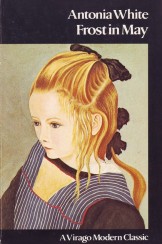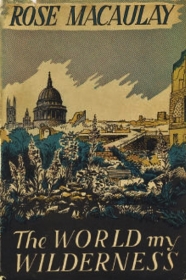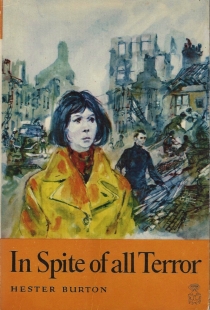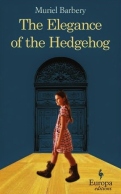I need to get some of this towering stack of books-to-be-discussed thinned out; my desk is way too crowded; no place to park the teacup! (And my spouse, coming in last night to “borrow” the computer, made comment on the situation and then graciously offered to shelve them for me – which though a sweet gesture is not necessarily a good thing, as he puts things in strange places. Our filing systems differ. 😉 )Time for a few round-up posts, I think.
Where to start? How to group these? Let’s see…
How about this trio of not necessarily bad books, but ones which could have been better. Definitely readable, but not top notch. (My personal responses only, dependent entirely on my mood at the reading moment – yours could be so much different, so please forgive me if I cold-shoulder one of your favourites.)
 Station Wagon in Spain by Frances Parkinson Keyes ~ 1959. This edition: Farrar, Straus and Cudahy, 1959. Hardcover. 224 pages.
Station Wagon in Spain by Frances Parkinson Keyes ~ 1959. This edition: Farrar, Straus and Cudahy, 1959. Hardcover. 224 pages.
My rating: 5/10
I’ve occasionally flirted with Keyes, because her books have such potentially interesting premises, but I invariably come away sighing. And sadly this concoction is no exception. The very best thing about it was the nine-page author’s foreword, in which she relates her own experiences travelling with her friend Kitty in immediately post-war Italy, France and Spain in 1946, with a rickety American station wagon loaded with relief supplies for an evacuated convent of Bendictine nuns.
Utterly fascinating – “Tell me more!” was my response – but no, Keyes blithely dismisses her own experiences and instead embarks on this rather creatively imagined fictional tale, which starts off reasonably well but soon bogs down in a morass of excessive detail and complicated plotting.
In brief(ish):
A young university professor unexpectedly inherits a large fortune, and, while mulling over his sudden change in situation and his deeply elemental boredom with his life to this point, receives a version of the infamous “Spanish Prisoner” letter in the mail. This one is purportedly from a real Spanish prisoner, and – how handy! – Lambert just happens to be a fluent Spanish speaker himself. Knowing full well that the letter is a scam, he feels that a diversion is in order, so he takes a sabbatical year from his teaching job, packs up his newly purchased big red convertible station wagon, says a dismissive good-bye to the young woman who has been scheming (well beknownst to Lambert) to marry him, and heads off to Spain.
The plot thickens, as Lambert immediately falls in with a luscious adventuress and carries on an intense shipboard flirtation. “Coincidences” start to fall together thick and fast. There does, to Lambert’s great glee, appear to be a genuine prisoner of sorts associated with the fabricated scenario – an impoverished Duke incarcerated in a private sanatorium. Who happens to have a lovely, virginal daughter who could not possibly be involved in any nefarious dealings…
The whole thing is rather bogged down in too much detail. There are long pages of explanation on all sorts of side-issues, as if the author is dead keen on the education of her readers as much as on their entertainment. The plottings of the wicked conspirators get rather see-through and slightly ridiculous early on, and the inevitable romance is just too predictable to be satisfying. (A pox on “love at first sight”, I emphatically say. At least in this situation.)
Moments of excellence; chapters of blah blah blah. Rated at 5/10 because I did willingly carry through to the end, despite my ever-increasing feelings of annoyance that the author would make such a messy job of such a promising plot, and turn her quite likeable protagonist into a bit of a blustering egoist. Points off, too, for the sweetly yielding female love interest (the new one in Spain, not the abandoned American, though she also pops up in Europe to add some more kinks to the tale) and the “unspoken communion of two passionate souls.” Ick!
 Neither Five nor Three by Helen MacInnes ~ 1951. This edition: Fawcett Crest, circa late 1960s. Paperback. 320 pages.
Neither Five nor Three by Helen MacInnes ~ 1951. This edition: Fawcett Crest, circa late 1960s. Paperback. 320 pages.
My rating: 6/10
Set in post-World War II New York.
I found myself rather taken aback by this story. While many of Helen MacInnes’ books demonstrate her strong stance on capital-C Communism (it’s 100% bad) this one takes that fixation to a whole new level. Instead of clean-cut English/American heroes and heroines flitting about the shadows of war-torn European cities, it’s all about the insidious influence of underground Commies on the home front (in this case America) after World War II, and it comes across as being deeply paranoid, viewed from half a century in the future.
The love story is utterly predicable and really rather sweet; the two lovers are likeable enough and I found myself in general wishing them well; but the anti-Red plotline pushed me past my comfort level into the “Really? Really?” territory. Even taking era-appropriateness into account. So black; so white. Shades of grey are evidence of weakness, on both sides.
MacInnes’ Commies are supremely well organized; they have infiltrated the American publishing industry and are placing their pawns very cleverly in order to slant the perceptions of readers in favour of the political left. Head honchos from the main office (as it were) in Europe undertake clandestine inspirational (and disciplinary) visits to American “party cells”; new recruits are jollied along until they are too deeply enmeshed to easily escape; then the gloves come off and any attempt to back away from participation or to “inform” is punishable by carefully engineered public disgrace, or, just possibly, sudden death. (Cue foreboding music…)
Definitely a Cold War period piece, which was received with warm approval by readers and reviewers of its time.
Excerpted from the March, 1951 Kirkus Review:
This is the most important book Helen MacInnes has done … absorbing and challenging from first page to last, as the devious methods of Communist penetration into the fields of public relations are revealed, and the terrifying network of Communist affiliation is convincingly recorded. Rona Metford is engaged to Scott Ettley, a journalist whose loyalties are torn between his mounting commitment to “the party” and his yearning for a normal course of love and marriage. Into this situation comes Paul Haydn, just returned to New York from a very hush-hush assignment in Europe and finding that his love for Rona, which he thought was a thing of the past, is still very much alive. The checkered course of love is traced against the background of gradually unfolding ramifications of the violence and falsity of Communist activities in the heart of the world they think they know…
I personally found the political bits verging on hysteria, and while there was an occasional authorial attempt made to balance the viewpoints by pondering why Clean Young Americans might be seduced to the Red Side, once they went too far they were brutally written off and became completely expendable, in the most ultimate way.
A precursor to MacInnes’ more “traditional” (i.e., European-set and action-packed) espionage stories which were to follow, blending an ideological plotline with a stereotypical together/torn asunder/together again romantic tale, with vaguely unsatisfying results.

























Winging It Over Africa and the Atlantic; Hurricanes and Foolish Pride; Sally Bowles (and Others) in Berlin; A Waif in War-Torn France
Posted in 1940s, Century of Books - 2014, Isherwood, Christopher, La Farge, Christopher, Laski, Marghanita, Markham, Beryl, Read in 2014, tagged Century of Books 2014, Dramatic Fiction, Goodbye to Berlin, Isherwood, Christopher, La Farge, Christopher, Laski, Marghanita, Little Boy Lost, Markham, Beryl, Memoir, Social Commentary, The Sudden Guest, Vintage, West with the Night on August 22, 2014| 18 Comments »
I’m pushing forward with the Century of Books project and am attempting to clear the decks – or would that be the desk? – for the next four and a half months’ strategic reading and reviewing, so these four books from the last month or two are getting the mini-review treatment. All deserve full posts of their own; I may well revisit them in future years. Though in the case of the three most well-known, Christopher Isherwood’s Goodbye to Berlin, Beryl Markham’s West with the Night, and Marganita Laski’s Little Boy Lost, there has already been abundant discussion regarding their merits and literary and historical context. I might just concentrate my future efforts on the most obscure of these particular four, Christopher La Farge’s The Sudden Guest, which I have earmarked for a definite re-read.
My rating: 9.5/10
In a word: Lyrical
Beryl Markham was born in England and moved to Kenya with her parents when she was 4 years old. Her mother soon had enough of colonial life and returned to England. Small Beryl remained with her father, and grew up in a largely masculine atmosphere made up of her father’s aristocratic compatriots, visiting big game hunters, and the native farm workers and independent tribesmen.
A highly skilled horsewoman, Beryl became a licensed racehorse trainer in Nairobi at the age of 17, after her father’s farm was wiped out during a severe drought, and he gave her the choice of accompanying him to South America for a fresh start, or staying in Africa to go it alone.
Beryl chose Africa, this time and, ultimately, forever more, dying there in 1986 at the age of 84, still staunchly independent, still very much on her game.
Beryl Markham was introduced to flying by her friend and mentor Tom Black, and took to the air with the same innate skill as she dealt with horses. She eventually concentrated strictly on flying, working as a contract pilot in East Africa, and hobnobbing with the famous (notorious?) aristocratic expatriates making homes and lives in Kenya during the 1920s and 30s, including Karen Blixen, Karen’s lover Denys Finch-Hatton (whom Beryl had her own affair with), Baron Blixen himself (Beryl was his pilot during scouting trips for wild game), and others of that large-living “set”.
In 1936 Beryl set out to attempt a solo flight over the Atlantic, from England to New York. She only just made it across, as an iced-up fuel line forced her crash landing in a bog on Cape Breton. The semi-successful attempt brought Beryl Markham much fame; she continued on with her flying career, though she ended her days once again training African racehorses.
In 1942 West with the Night was published, to much acclaim. It is a memoir made up of chapter-length vignettes of Beryl’s childhood and her experiences with horses, and, most beautifully described, her experiences in the air, including an account of the Atlantic flight. The language is both elegant and heartfelt; I used the term “lyrical” to sum up this book, and that is exactly what this is. Really a stellar piece of work.
There has been much speculation as to who really wrote this book. Many have theorized that Beryl had at least some help with it. Her third husband, Raoul Schumacher, was a journalist who also worked as a ghostwriter; the noted aviator and writer Antoine de Saint Exupéry, another of Beryl’s lovers, had a similar writing style. No one knows for sure, as Beryl firmly maintained that the work was completely her own, though her compatriots were stunned when the book came out as they had never known Beryl to be anything of a writer, and she never produced anything after 1942’s West with the Night.
No matter. This is an elegant bit of memoir, well worth reading for the beauty of its prose, and for the portrait it paints of its twin subjects: the truly unique Beryl Markham and her lifelong strongest love, Africa.
My rating: 7/10 for this first encounter, quite likely to be raised on a re-read.
In a phrase: Bitter musings of a self-centered spinster
Oh, golly, where to start with this one. I can’t quite remember where I got it; likely from Baker Books in Hope, B.C. I remember leafing through it in a bookstore, hesitating, and then deciding it was worth a gamble. Another small triumph of bookish good luck, as it is an intriguing thing, and well worth reading.
It is autumn of 1944, and sixty-year-old Miss Leckton maintains a summer house on the Rhode Island shore; her primary home is her New York apartment. Living alone except for a middle-aged married couple who caretake for her, and a daily housekeeper, Miss Leckton has much time to spend in introspection, and what a lot of self-centered opinions she has assembled, to be sure.
Miss Leckton is supremely selfish and egotistical. She has cast off her closest relative, her niece Leah, due to Leah’s engagement to a young Jewish man. For Miss Leckton hates the Jews. (She muses that Hitler, for all his undoubted faults, has the right idea about suppressing them.) She doesn’t think much of the Negroes, either, which makes thing a tiny bit awkward as her resident married couple, the Potters, are black. The local Rhode Islanders are beneath her notice, mere country bumpkins. One actually has a hard time identifying whom exactly Miss Leckton identifies with herself; she is that uncommon creature, “an island unto herself”, to paraphrase John Donne, who doesn’t appear to want or need anyone, and is steadfast in her self-superiority to everyone around her.
Now a hurricane is reported to be blowing in , and Miss Leckton is reluctantly preparing to batten down the hatches, so to speak, though she persists in thinking that the radio reports are over-hysterical. For hasn’t Rhode Island just barely recovered from a brutal storm, the hurricane of 1938? Another just wouldn’t be fair…
I will turn you over to the Kirkus review of 1946, which is quite a good summation of the style of The Sudden Guest, though the comparison to Rumer Godden’s Take Three Tenses is not entirely accurate, in my opinion. There are enough similarities in technique to let it stand, though.
I searched online for more mention of this unusual and well-written novel and found a really good review, including a creative analysis of what Christopher La Farge was really going on about – the American isolationism prior to the U.S.A.’s entry into World War II, and, to a lesser degree, Miss Leckton’s denial of her own “homoerotic feelings”. Check it out, at Relative Esoterica.
Check out this vintage cover: “Bohemian Life in a Wicked City”
Goodbye to Berlin by Christopher Isherwood ~ 1945. This edition: Signet, 1956. Paperback. 168 pages.
My rating: 10/10
Oh gosh. This was so good. So very, very good.
Why haven’t I read this before?
Perhaps because I have always associated it with the stage and film musicals titled, variously, I am a Camera and Cabaret (cue Liza Minnelli) which were inspired by the book, or rather by one episode early on featuring teenage not-very-good nightclub singer Sally Bowles and her apparent intention of sleeping with every man she comes across whom she thinks might possibly become a permanent patron.
But this book goes far beyond the tale of Sally Bowles, memorable though she is with her young-old jaded naivety and her chipped green nail polish and her heart-rending abortion scene.
Christopher Isherwood has fictionalized his own experience as an aspiring writer in 1930s’ Germany, where he made a sketchy sort of living teaching English to respectable young ladies while spending his free time hanging out with (and observing and recording the goings-on of) the artsy crowd and the cabaret performers and patrons of Berlin’s hectically gay (in every sense of both words) theatre and entertainment district.
Goodbye to Berlin is superbly written, deeply melancholy at its core, and only occasionally sexy. It’s a rather cerebral thing, thoughtful as well as charming and deeply disturbing, picturing as it does Berlin between the wars and the numerous characters doomed to all sorts of sad fates – at their own hands as much as through falling afoul of the Nazi street patrollers.
Am I making Goodbye to Berlin seem gloomy? I hope not, because it isn’t. It is poignant, it is funny, it is occasionally tragic, but it is never dull, never gloomy. And Isherwood’s Sally Bowles – who is really something of a bit player in Goodbye to Berlin, appearing only in one episode of these linked vignettes – is a much different creature than that portrayed on stage and film.
The internet is seething with reviews of Goodbye to Berlin, if this very meager description makes you curious for more.
Christopher Isherwood, I apologize for my previous neglect. And I’m going to read much more by you in the future. This was excellent.
A must-read.
(Says me.)
My rating: 7.5/10
My feeling after reading: Conflicted
I had such high hopes for this novel, and for the most part they were met, but there was just a little something that didn’t sit quite right. Perhaps it was the ending, which I will not foreclose, merely to say that I thought the author could have held back the final episode which provides “proof” of the identity/non-identity of the lost child. It felt superfluous, as if Laski did not trust the reader decide for oneself what the “truth” was. Or, perhaps, to go forward not quite sure of that identity. Knowing one way or the other changed everything, to me, and oddly lessened the impact of what had gone on before.
Most mysterious I am sure this musing seems to those of you who have not already read this novel; those who have will know what I am going on about.
In the early days of World War II a British officer marries a Frenchwoman. A child is born, the Englishman must leave; the child and his mother stay in France. In 1942 the child’s mother, who is working with the Resistance, is killed by the Gestapo. The child is supposed to have been taken to safety by another young woman; on Christmas Day of 1943 the father learns that his son has been somehow lost; no one knows where the baby has been taken.
In 1945, with the war finally over, the father returns to France to seek out his child, whom he remembers only as a newborn infant. A child has been located who may be the lost John – “Jean” – but how can one be sure?
Well written, with nicely-maintained suspense and enough verisimilitude in the reactions of would-be father and might-be son to keep one fully engaged. I will need to re-read this one; perhaps I will come to feel that the author’s approach to the ending is artistically good, though my response this first time round was wary.
Interesting review here, at Stuck-in-a-Book; be sure to read the comments. No spoilers, which is beautifully courteous of everyone. 🙂 I must admit that my own easily-suppressed tears were those of annoyance at the last few lines, as I thought they weakened what had gone before.
But on the other hand…
You will just have to read it for yourself. And you really don’t want to know the ending before you read it; the suspense is what makes this one work so well.
Read Full Post »